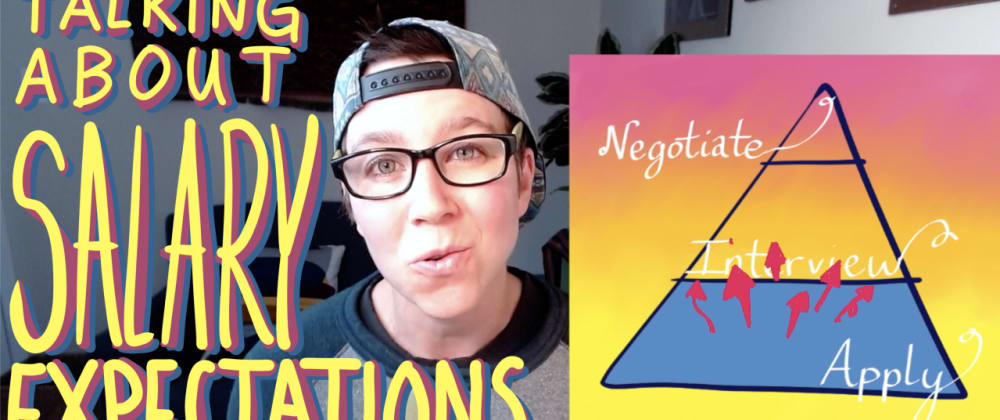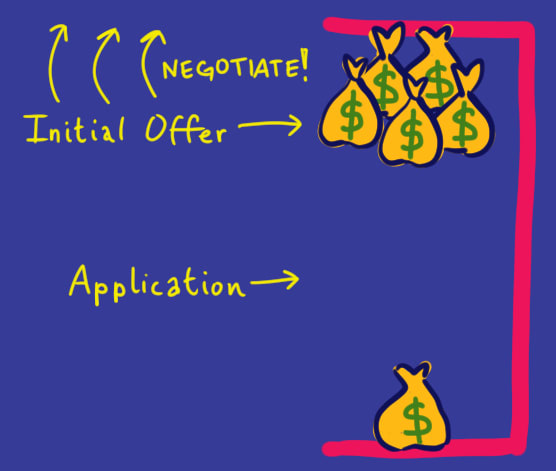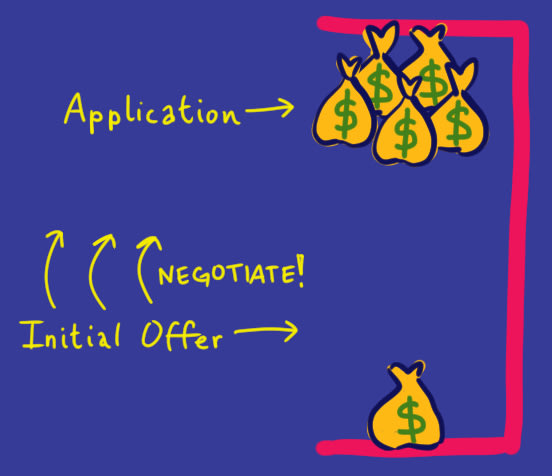Last week, I shared key phrases that you can use to answer the question, "What's your current salary?" when it is asked early in the application process.
This week, I want to help you answer another application question, "What's your desired salary?"
Context from an Ideal Multiverse
In order to have the ideal answer, you would ideally know the true range that MoneyCorp is willing to pay someone to fill this position. I'm not talking about what they would pay someone based on their years of experience or the quality of their work, or necessarily even the range that the recruiter tells you they'll pay for this role.
Maybe MoneyCorp holds strictly to a transparent pay range. Or maybe the true range is not written down anywhere, much less decided in an intentional way. If we had a machine to explore the multiverse, we could see what MoneyCorp would actually pay different people to do the same position, or even what MoneyCorp would pay the same candidate to do the same role depending on how that candidate negotiated or interacted during the hiring process. Exhaustively testing market potential is a great way to know the true range of a role if you have the equipment.
Most of us don't have a multiverse explorer, however all of us still have the same goal: to say a number that's at the tippity-top of the range BUT NOT OVER.
It's important not to go over the max because this is only the application stage, not a negotiation. The recruiter doesn't know much about you, especially if you're not part of an internal referral network and don't have a champion on the inside. The more candidates the recruiter is balancing, the more likely the recruiter is ruthlessly allocating their time. Recruiters and interviewers don't have time to spare for candidates that aren't likely to receive or accept an offer.
Your primary goal in the application stage is to get interviews. Once you get interviews, you can impress everyone you speak with and become someone they want to invest more and more time and resources into. Outstanding interview performance is great leverage for getting a fantastic initial offer or negotiating a standard initial offer.
But hey, we're answering this question in the application stage. If you tell the recruiter that you're looking for a salary that is much higher than they can pay, the recruiter might think you're not a good fit. They may reject you outright, or more commonly ghost you or spend their time elsewhere with more promising candidates until you hear back that they've filled the position already.
Anchoring
People might tell you to never say the first number in a negotiation.
Not only are application conversations not negotiations, but "classic" negotiation techniques don't always apply to employment negotiations in which candidates are propelled forward by maintaining a sense of alignment and excitement.
What is anchoring?
An anchor is the first number that gets stated in a negotiation. It's the number against which all subsequent negotiations follow.
For example, if a recruiter gives you a verbal offer for $120,0000, but you're looking for a salary closer to $140,000, that $120,000 is the anchor that you'll have to pull up.
If you were actually expecting a salary of $200,000 and the anchor is still $120,000, well that's a tall mountain to climb! The whole point of recruiters asking about expectations early on is so that candidates don't get to the offer stage with such a large mismatch of expectations. (For what it's worth, Adam and I have successfully coached a candidate through a negotiation change this big, but that is not the norm!)
What's more important than WHO says the first number is *WHAT THE FIRST NUMBER IS.
If you:
- Have done your research and you know about the company's pay structure and capabilities, and
- Have a good idea of your market value, and
- Have reflected on what you need and want
Then saying a number first could be a good thing.
But I digress, because again, this is an application not a negotiation. There are the two scenarios that play out for candidates, assuming you get an offer eventually:
Anchoring Scenario 1
You give a reasonable number in the application stage, let's say $140,000.
Because you've managed to impress all your interviewers, you get an even higher initial offer, say $145,000.
The initial offer of $145,000 is the anchor point for negotiation.
Anchoring Scenario 2
You give a reasonable number in the application stage, let's say $140,000 again.
For whatever random reason -- leveling, budget, lowballing, whatever -- the initial offer is $120,000.
Again, the initial offer is the anchor point for negotiation.
In neither case does it matter what your application number was. As I said in my post "Six Reasons Candidates Don't Negotiate," Adam and I have phrases to reset expectations after interviewing.
Regardless of the number you say in the application stage, a lot has changed for both you and the company by the time you've done all the interviews. You can't go back on a rejection and get interviews that the recruiter thinks are wasted on you, but you can keep your stance open and move forward until it's time to politely and directly clarify your compensation expectations before accepting an offer.
So don't worry about low balling yourself during the application stage.
That doesn't mean I want you to be meek or say that you don't care about salary or waste your own time. Nor does it mean that this question is easy or unimportant. It's complicated (more complicated than a black belt l33tcode optimization puzzle), and that's why I want you to focus on prioritizing one step at a time.
Phrase #1: Competitive Offer
When a recruiter asks you to share your desired compensation, here's a good response:
You may need to adjust this phrase to your specific situation. You don't want recruiters to think that you'll waste their time with a bunch of interviews only to reject an offer as too low.
While big companies are used to being competitive with the market, if you are applying to a small startup, you don't want to make it sound like you're expecting market-equivalent cash. That's not what they're going to be able to provide, so they may move on to other candidates that are a better fit.
Whatever your situation, think about what that specific company is looking for, and communicate the aspects the resonate with you (you contain multitudes; don't put yourself in fake or harmful boxes). For example:
"I'm looking for a competitive offer, but what's really important to me is..."
- making a big difference on [thing related to company mission or role]
- working on challenging projects and solving hard problems
- working with amazing people
Be excited. Show them that you are a good fit. Keep this train moving forward to interviews.
Phrase #2: More Information
One of the best things you can do is arm yourself with more information, and one of the best sources of information is the person who asked you about compensation to begin with.
Every piece of information you gather is one side of a complex and inconsistent object, so keep an open mind to different angles. That said, the person you're talking with in the application stage is likely the person who's going to decide whether you get that tech screen or phone call with a hiring manager.
Since the interview is your real goal, not negotiating the most accurage compensation amount, ask the recruiter what they're looking for and see if you fit into that.
There's no reason moving forward in a process if you know that a salary is way too low for you, but if it sounds close enough, keep that train rolling forward. It's ok to have concerns while still being interested (but please hide your concerns for now). If you stay in the game you (and them) can get more information and eventually, hopefully, be in a position to make a decision later.
Thus, when a recruiter asks you for your compensation expectations, ask them back:
Note: in some states, including California, companies are supposed to disclose salary ranges when asked. Check the exact details for your state here
Phrase #3: Pick the High Number
Let's say you ask for a range and the recruiter says that the range for this role is $120,000 - $140,000. Pick the high number and move forward.
Good answer! You've picked a single number, it works, the recruiter checked the box, let's move on to interviewing.
I think ranges are confusing because they get your hopes up about the high number, and the company's hopes up about the low number. Pick the highest number in the range and go with that.
When would you use a range? Maybe if you wouldn't accept a job less than $145,000 or $150,000, and you're hoping that by the time an offer comes your way you can negotiate it up.
That sound good. I'm looking for compensation around $140,000 - $150,000.
This introduces risk, especially if you don't qualify the statement and use a cagey or disappointed tone. It sounds like you're not really interested in this job. If you're not interested, the recruiter has less risky ways to spend their time! If you don't have other candidacies moving along with a higher range, or if you are open to learning more and considering a compensation trade-off, even if $150,000 is your preference, I suggest focussing on your current situation -- which means picking a less risky number and getting interviews! -- and dealing with the reality that occurs later.
Of course, if you have other options or leverage or decision certainty, don't waste your own time, either. Save it for those other phone screens and on-site interviews and higher offer negotiations!
Final Thoughts
If the recruiter already clarified the salary range for you in a previous conversation, then in this conversation, you can answer their question about salary expectations directly:
I'm looking for a competitive salary around $140,000.
Keep in mind that just because you've heard a co-worker or the website talk about a particular range, you might be misunderstanding a more complicated situation.
Still ask the recruiter for the range for this position, just in case. Ask in a polite manner to hear what they say even if you already have intel from another source.
If the range the recruiter tells you is lower than what you were expecting from a different source, you could bring that up in this moment if it's important to you.
Phrase it as a question, for example, "Can you help me understand why your website says something different?" or "I heard from a friend of mine who works at the company that the ranges is $XXX. Can help me understand that difference?"
Remain polite through out the conversation. You're trying to understand the situation, but until you have an offer the details can and will change. Your primary goal is still to have a nice conversation, and for the recruiter to know that you are (hella) interested and walk away thinking that you are an excellent fit.
Oh yeah, and if they have to mark compensation expectations down, sure, put it at the high end of the range if possible.
If you found this post helpful, please please share it with a friend.
If you have a candidate question for Adam and I to answer, email us at CandidatePlanet@gmail.com We will give you personal advice and anonymize your question for other candidates to learn from, too.
Thank you to Adam Dangoor for developing this material with me at DangoorMendel, and thank YOU for reading this long post.
Subscribe to candidate planet for new interview and negotiation tips every week. Next week I'll explain the two numbers you need to know before you go into negotiating a job offer.
Brought to you by Adam Dangoor and Lusen Mendel, the team behind candidates who kick butt.
POST NOTES
☆ Compensation range disclosure laws by state: https://www.hrdive.com/news/salary-history-ban-states-list/516662/
HAVE A CANDIDATE QUESTION YOU WANT US TO ANSWER?
☆ candidateplanet@gmail.com
OTHER WAYS TO CONSUME THIS CONTENT:
☆ Youtube ☆ https://www.youtube.com/channel/UCdvny6qs8e4VUJIG01puw2Q
☆ Newsletter ☆ https://www.dangoormendel.com/blog (sign up at top of blog)
☆ Podcast ☆ https://candidate-planet.simplecast.com
☆ Dev.to ☆ https://dev.to/candidateplanet
MORE ABOUT DANGOORMENDEL:
☆ DangoorMendel ☆ https://www.dangoormendel.com
☆ Speaking and Client Inquiries ☆ hello@dangoormendel.com
☆ Lusen on LinkedIn https://www.linkedin.com/in/lus
☆ Lusen on Twitter ☆ https://twitter.com/staycalmcomic
☆ Adam on LinkedIn ☆ https://www.linkedin.com/in/adamdangoor
☆ Adam on Twitter ☆ https://twitter.com/adamdangoor














Top comments (9)
This is a really elaborate article and a really good prooposal if you feel you can do it.
But let's face it, a lot of us developers are really bad at talking money.
And there is much way we can do it wrong.
So I have a simpler alternative.
NOTHING. YOUR OFFER IS NOTHING.
You make a commitment to not answer this question, to procrastinate as much as possible on this, to let them do the first offer.
I am serious.
If you don't feel confident talking about money, the downsides of trying to make a number up are much larger that the upside of it.
I like the simplicity of what you're encouraging. I agree it's best to avoid discussing salary if you can. However, I would avoid all-or-nothing responses when possible, especially so early in the candidacy.
I would try to balance "doing the best thing" with not worrying too much about "anchoring" when you are in the application stage, especially if it's causing you to miss out on interviews and opportunities that would have been valuable to you.
Practice and prepare for the conversation (try to avoid, ask for range, pick the high number, done!), and let what happens happen -- hopefully an interview.
The general recommendation of "never say the first number" is an oversimplification of anchoring. The first number does become an anchor, but it's more important that the anchor is a good first number... doesn't matter who says it first.
But anyway you're not negotiating until you have an offer, and by then you can anchor or re-anchor.
If you or anyone else wants to have a practice convo, let me know. It would be fun and educational for both of us.
All true here @candidateplanet
What about this?
Q: What's about your salary expectation?
A: Salary expectations?
A: Mmmh, I'd rather not answer at that point.
Q: But I need a number to continue!
A: Does it have to be now? Because I'm stressed discussing that by phone when we barely know each other and you cannot know yet which can of value I can bring to the company.
Q: It's not the final number, it's not me, my software requires a first number or a range in order to continue. And I don't want to waste your time. If you ask for $500.000, I cannot offer you that.
A: Oh I see, no, I'm not one of those devs asking for $500.000.
A: Look, I know you want to be fair. You know the salaries people at your company have for this kind of position. I don't want to be paid more than everyone else. I don't want to be paid less than everyone else. Pick something in the middle, that will do for a first number.
Here I say nothing myself but I have a reasonable anchor.
What could go wrong?
If the recruiter insists that he doesn't want to be fair, or that he doesn't know the salaries at his company, then it's easy
please don't work with those guys.
It's also useful to use recruiting companies salary surveys and reports. It gives you an idea for the last year of the salary ranges for different roles and different skill and experience levels.
With that information, and the strategy described in this post, you can get a great start in negotiating your ideal salary.
This is putting the cart before the horse in my opinion: they should be telling YOU what THEY can pay.
Heck yeah! We're can't have healthy employment relationships until companies and managers take responsibility for information asymmetry and the power imbalance it causes.
I haven't seen pre-emptive salary disclosure too much in tech, but there are some job boards that list compensation alongside roles. Women Who Code and Idealist come to mind.
Unfortunately thats not how it goes on most cases. You might find a recruiter or company that puts in front the expected salary, range or not. But normally they will be out fishing for candidates they can pay less for the same skill level.
So this is a very important skill to learn. Not just for developers, but for anybody in the job market.
Love the hand written elements!!
Thanks! I would like to do more of them, and appreciate the encouragement :-)